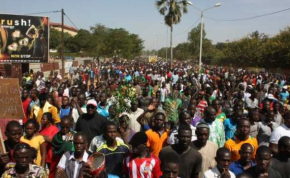Subject: *DHR* Rwanda - Burkina Faso a warning to other African leaders.
Burkina Faso a warning to other African leaders
- See more at: http://www.vanguardngr.com/2014/10/burkina-faso-warning-african-leaders/?#sthash.O4g5XeU1.dpufNairobi – Violent clashes in Burkina Faso that led to the overthrow of the president are a stark warning to other African leaders pushing constitutional change to hang on to power, analysts say.Chaos in Burkina Faso erupted this week as lawmakers prepared to vote to allow 63-year-old Blaise Compaore — who took power in a 1987 coup — to contest elections in November 2015.People celebrate in the capital Ouagadougou after Burkina Faso's embattled President Blaise Compaore announced earlier on October 31, 2014, he was stepping down to make way for elections following a violent uprising against his 27-year rule. Blaise took power in a coup in 1987 but quickly swapped the "democratic revolution's" Marxist ideals for authoritarian rule. AFP PHOTOWhile Compaore was forced out Friday, Burkina Faso is far from alone in having a president reluctant to relinquish office."It is a warning both to ageing regimes and for those trying to stay in power beyond constitutional limits," said Thierry Vircoulon of the International Crisis Group (ICG)."During the Arab Spring the question was whether Africa will have its own spring? Perhaps the attempts to change the constitutions will lead to it now."Countries including Benin, Burundi, Congo-Brazzaville, the Democratic Republic of Congo and Rwanda are all reportedly pondering change to allow their leaders a third term.But the impact of events in Ouagadougou, and the storming of its parliament, may give several leaders across the continent "pause for thought", said Paul Melly from Britain's Chatham House."Burkina Faso has demonstrated that in today's Africa popular acquiescence cannot be taken for granted," Melly said.– 'Wake-up call for presidents' –Burkina Faso is far from the first country where heads of state seeking to extend their rule have been challenged.In Niger, Mamadou Tandja was ousted by the army in 2010 after a third-term bid, while in contrast, Senegal's President Abdoulaye Wade lost 2012 elections despite winning constitutional permission to run three times.Some have carried it off. Cameroon's Paul Biya, in power since 1982, successfully changed laws for another term in 2011, but the strongman had ensured the opposition was quashed.Other nations were laws have been tinkered with to the benefit of their leaders include Algeria, Angola, Chad, Djibouti and Uganda.But events in Ouagadougou may ring alarm bells for others."The evolving situation in Burkina Faso will hopefully serve as a wake-up call for presidents who are considering tailoring the constitution to suit their own interests, in west Africa and beyond," said David Zounmenou, from the South African-based Institute for Security Studies (ISS).And while the African Union sanctions those who make constitutional changes for the purpose of staying in power, such threats have had little impact, Zounmenou added.Countries vary and not all leaders have been in power for as long as the 27 years Compaore lasted, Vircoulon said, noting that a crucial factor would be "the state of mind" of the people.In tightly controlled Rwanda, allies of strongman President Paul Kagame have called for referendum to change the constitutional to allow him to run in 2017.In contrast, the political climate in neighbouring Burundi is far more volatile for President Pierre Nkurunziza, who is expected to defy critics to run for a third term next year."Authoritarian traditions are still influential in some countries," Melly said. "Few would bet against Kagame or Congo-Brazzaville's Denis Sassou-Nguesso successfully pushing through a rule change to open their way to further terms of office."For others however the risks are greater.Burundi's Nkurunziza and DR Congo's Joseph Kabila might "be "tempted to follow suit –- although for them it could be a higher risk exercise, governing countries with vocal civil society and state machines of limited establishment power," Melly added.And while Compaore's fall may provide a lesson to some, many will still be tempted.It is "up to the citizens to take responsibility to counter these political adventurers who undermine democracy and the promotion of lasting peace," Zounmenou added, lamenting Africa's reputation as a place of non-stop crises."It is time to change that, to make democratic structures outside individual politicians to allow socio-economic development," he said.You might also like
--
SIBOMANA Jean Bosco
Google+: https://plus.google.com/110493390983174363421/posts
YouTube Channel: http://www.youtube.com/playlist?list=PL9B4024D0AE764F3D
***Fuseau horaire domestique:
heure normale de la côte Est des Etats-Unis et Canada (GMT-05:00)***
Envoyé par : Jean Bosco Sibomana <sibomanaxyz999@gmail.com>
__._,_.___
Posted by: Samuel Desire <sam4des@yahoo.com>
| Reply via web post | • | Reply to sender | • | Reply to group | • | Start a New Topic | • | Messages in this topic (1) |
----------------------------------------------------------
The Voice of the Poor, the Weak and Powerless.
-----------------------------------------------------------
Post message: AfricaRealities@yahoogroups.com
Subscribe: AfricaRealities-subscribe@yahoogroups.com
Unsubscribe: AfricaRealities-unsubscribe@yahoogroups.com
List owner: AfricaRealities-owner@yahoogroups.com
__________________________________________________________________
Please consider the environment before printing this email or any attachments.
---------------------------------------------------------------------------------------------------------------------
-http://www.africarealities.com/
-https://www.facebook.com/africarealities
The Voice of the Poor, the Weak and Powerless.
-----------------------------------------------------------
Post message: AfricaRealities@yahoogroups.com
Subscribe: AfricaRealities-subscribe@yahoogroups.com
Unsubscribe: AfricaRealities-unsubscribe@yahoogroups.com
List owner: AfricaRealities-owner@yahoogroups.com
__________________________________________________________________
Please consider the environment before printing this email or any attachments.
---------------------------------------------------------------------------------------------------------------------
-http://www.africarealities.com/
-https://www.facebook.com/africarealities
.
__,_._,___







